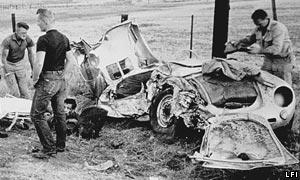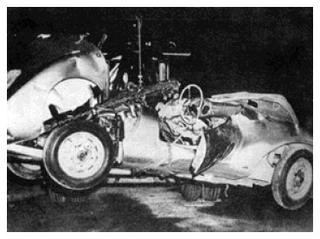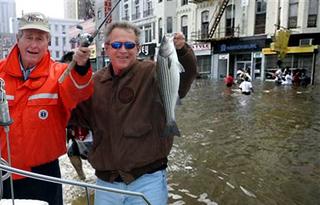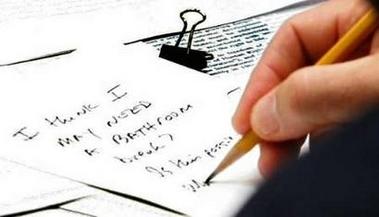What are decent-minded, US Christian conservatives to do if they want to watch a film without upsetting their sensibilities? Now they can watch their favorite blockbuster stripped of any sex and violence, thanks to two new companies.
A few years ago, it dawned on American food manufacturers there was an intriguing hole in the market to fill: vegetarians who wanted to eat hamburgers while remaining vegetarian, or vegans who had a craving for egg salad.
Today, the supermarkets are filled with bean curd-based meatless burgers and eggless egg salads, and they are hot sellers. Vegan cafés boast menus filled with bacon, steak and all manner of other forbidden items that have been made safe for the meat-averse.
As with food, so it is with films.
What are decent-minded middle-American Christian conservatives to do if they abhor sex, bad language, illicit drug use and gut-spilling violence but still have an urge to see Saving Private Ryan? Or Goodfellas? Or The Amityville Horror? The beginnings of an answer came a few years ago with the advent of CleanFlicks, a kitchen-sized Utah company that decided to offer videos and DVD for rental - after they had been edited to remove all content likely to be offensive to the local Mormon population.
Today, that kitchen-sized enterprise has turned into a veritable industry, spanning numerous states and attracting the attention of both lawyers and politicians all the way to Washington. CleanFlicks is going from strength to strength, offering its services on a monthly subscription basis much like the wildly successful mainstream company Netflix. And a second, even more sophisticated, company called ClearPlay, also based in Utah, has sprung up.
ClearPlay doesn't edit the films as such, but rather offers a series of filters so individual consumers can decide how much sex or violence they want to tolerate. Fancy seeing A Mighty Wind, the gentle Christopher Guest satire spoofing folk music, but without the "revealing clothing"? No problem. Want to see a gritty urban drama like the recently released Crash, which examines racism in Los Angeles, but without the "implied premarital sex"? Just press the appropriate button on your DVD menu and you can relax in the knowledge that all suggestions of illicit nookie have been purged ahead of time.
The service has not only proved popular in conservative states such as Utah. There is some evidence it appeals to a much broader range of movie consumers, particularly families concerned about the content Hollywood is throwing at their children, even at a tender age. The sanitizing companies have even set to work on Shrek and Shrek II, finding the animated smash hits replete with squirm-inducing sexual innuendo and language that may not be cursing as such but is still too salty for their puritan tastes.
The film industry, as might be expected, has not reacted well. Starting three years ago, when CleanFlicks started making its first serious commercial inroads, the Directors Guild and the Writers Guild have been railing at what they see as a straightforward infringement of intellectual property.
For while their work is modified and edited all the time - for broadcast on television or on commercial plane flights, for example - the difference is that these modifications are done with their permission, through formal licensing agreements. CleanFlicks and ClearPlay don't ask for permission from anyone, arguing instead that their adjustments and amendments fall under the category of "fair use".
The two sides quickly fell into a predictable legal dispute, which dragged on until earlier this year when the Bush administration itself decided to get involved and passed the Family Movie Act, which sanctioned what the sanitizers were doing and was signed into law explicitly to make the legal challenge from the Hollywood bigwigs - among them Steven Spielberg, Martin Scorsese and a host of other first-rank directors - vanish into the judicial ether.
As far as the White House was concerned, the law was an easy way of appealing to the Republican Party's fundamentalist Christian base and bashing one of its favorite targets - Hollywood's free-speech liberals. Quite a few Democrats jumped on board as well, partly because of a perceived need to defer to the conservative "family values" agenda and partly because the Bill also embraced a handful of anti-piracy provisions that the film industry was keen to see entered into law.
From a cultural point of view, though, the debate has left several questions unanswered. One, if people really don't like watching films where characters behave badly, drink alcohol, have sex or slice each other with carving knives, why don't they simply avoid them altogether? Two, aren't they conflating the very different issues of protecting children from Hollywood inanity and mauling the work of genuine film artists who have a specific vision to express, and a specific way to express it? And three, if Christian fundamentalists are really so sensitive about entertainment products featuring distinctly non-Christian behavior, how come the Bible Belt watches television shows like Desperate Housewives - about a group of bored, drug-addled, adulterous suburban women - more avidly than any other region in the country?
The hypocrisies of excessive puritanism have been an irresistible spectator sport for centuries, not just in the United States, and the advent of the DVD profanity police is no exception. Part of the fun of visiting the ClearPlay website, over and above the intriguing categories available for censorship (what, one wonders, qualifies as a "non-graphic injury/wound"?), is seeing where the content police were forced to give up. The site's listing for Crash, for example, includes this line: "Filter settings not available: ethnic and social slurs." In a film preoccupied to the point of obsession with racist attitudes and behavior, one would think not. But surely someone somewhere will still take offense? The CleanFlicks site ("It's about choice!" screams the banner headline) is even funnier when it delves into the technical minutiae of censorship. The list of profanities the company says it systematically excises includes "the B-words, the H-word when not referring to the place, the D-word, the S-word, the F-word etc ..." It also includes references to deity (G-word and JC-words etc), only when these words are used in a "non-religious context". One could spend an afternoon figuring out exactly what all these forbidden terms are, or else marvel at how conversant those easily offended clearly are with the objects of their offense
The criteria for violence are intriguing, not least because the puritan right wing in the United States has clearly had much less of a problem over the years with blood and guts than it has, say, with teenage kissing. (Pain being a much less problematic category for them than pleasure.) Sure enough, CleanFlicks tells us it doesn't edit all violence - "only the graphic depictions of decapitation, impalements, dismemberment, excessive blood, gore etc."
The founder of CleanFlicks, Ray Lines, first had the idea for his business in the late 1990s, when he prepared a sanitized version of Titanic for his Mormon neighbors minus the relatively brief moments of nudity and sex. Soon he was taking it upon himself to decide all kinds of sensitive cultural questions. He once told The New York Times about Schindler's List, the Oscar-winning Holocaust drama: "Every teenager in America should see that film. But I don't think my daughters should see naked old men running around in circles."
ClearPlay, meanwhile, is the brainchild of Lee and Matt Jarman, two brothers from the heavily Mormon town of Orem, who developed the software that enables them to place filters on commercial DVDs. Copyright lawyers and entertainment executives tend to have fewer problems with their operation, because the DVD that arrives in the consumer's hands is intact, and it is up to each individual viewer how to edit the content, much as they might on their own - albeit more crudely - with the fast-forward button on their remote.
CleanFlicks, on the other hand, not only modifies the films without permission, but then makes money on the basis of those modifications. Without the Family Movie Act, it seems likely the company would have fallen foul of the law and lost its legal battle with the Directors Guild.
Despite the passing of the Act, the federal judge who had been hearing the case indicated his displeasure at the video companies' behavior by ordering them to meet their own costs even as he threw out the case against them. The companies had been looking for a complete vindication - in fact, back in 2002, CleanFlicks had pre-emptively sued the Directors Guild precisely to seek a declaration that what it was doing was legal. But Judge Richard Matsch (previously best known for presiding over the trial of the Oklahoma City bomber, Timothy McVeigh) refused to grant what they were looking for.
Troy
Brad Pitt has been summoned to kill his enemy. He raises his sword, runs towards him, and then ... er, not much. CleanFlicks cuts away to another shot. "The point we would make here is that you still see the guy dies, you still see that Brad Pitt killed him, and so you don't really take away from the story of what's going on," explains company founder Ray Lines.
Gosford Park
The refined world portrayed in Robert Altman's film is even more buttoned-up after ClearPlay has done its work on Julian Fellowes' screenplay. When one valet, describing his master, says: "He thinks he's God almighty. They all do," the first sentence is cut out, leaving just: "They all do." The result? A rather cryptic comment which makes no sense whatsoever.
Braveheart
Foul language is muted rather than skipped in this stirring tale of Scottish nationalism, while close-ups of bodily contact and battle wounds are kept in. But the famous mooning scene, involving Mel Gibson's bottom and the English army, is skipped altogether and most of the battle is eliminated. William Wallace would be turning in his grave...
Saving Private Ryan
The notorious 24-minute opening scene involving D-Day death and gore on the Normandy beaches is made far more palatable, as is the generally brutal depiction of battle throughout. Despite director Steven Spielberg's insistence that these images are critical in showing the sacrifice of troops and the true nature of warfare, CleanFlicks finds them too much to take.
The Matrix Revolutions
For an action flick, the edited version of The Matrix Revolutions doesn't contain much action. Viewers expecting foul-mouthed threats and a cut-throat fight between good and evil are more likely to be entertained by such dastardly warnings as: "The only way you're getting through this door is over my big dead (muted word)!"
The Godfather
In the sanitized version of The Godfather, Sonny Corleone (played by James Caan) does not die in a hail of bullets pounding relentlessly into his car. He just... well, he's sort of there one minute and gone the next. And the notoriously gory horse's head bit? Eighteen seconds is cut from one of the most famous scenes in recent cinema history

























